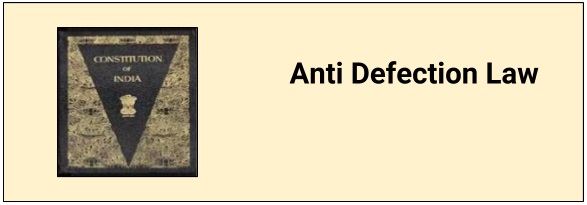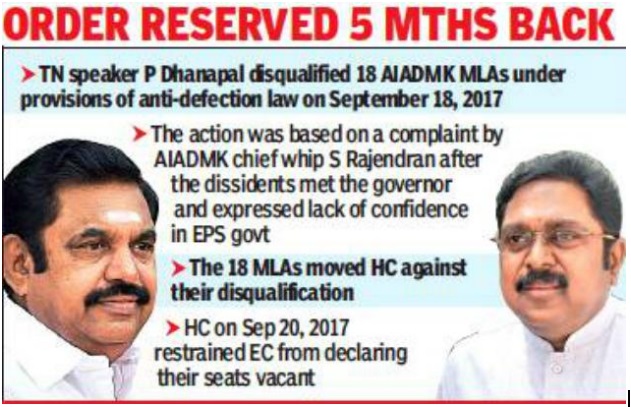Anti Defection Law and The 10th Schedule of Constitution : : Important Topics for UPSC Exams

Anti Defection Law and The 10th Schedule
Anti defection law was introduced by the 52nd constitutional amendment act 1985 to prevent the defections from one political party to another in lieu of certain gains by members of parliament and state legislatures, it led to introduction of 10th schedule. It was further refined by 91st constitutional amendment act 2003.
(A) Provisions :
1.Members of Political parties: A member of the house(parliament or state legislature) becomes disqualified for being the member of the house in case of following :
(a) If he gives up the membership of political party voluntarily .
(b) If he votes or abstains from voting contrary to the directions issued by his political party without obtaining prior permission of party and such an act has not been condoned by party within 15 days.
2.Independent members: Such a member becomes disqualified for being the member of the house in case he joins a political party after being elected to the house.
3.Nominated member: Such a member becomes disqualified if he joins a political party after the expiry of six months from the date on which he takes the seat in the house.
(B) However there are exceptions to these general rules:
1.Merger: If a member leaves the party as a result of the merger of party with another party the rule of defection does not apply (A merger is said to take place when two third of the members have agreed for merger). This was modified by 91st amendment , previously it was one third.
2.Presiding officer: If a member leaves his party temporarily on account of being elected as the presiding officer of the house to maintain the dignity of the position, he is not considered as a defecting member.
(C) Deciding authority :
Any questions regarding disqualifications arising out of defection is to be decided by presiding officer of the house. The act also provided that the decision of the presiding officer is final and is not subject to judicial review however Supreme court in its judgement in Kihoto Holohan vs Zachillu opined that presiding officer while deciding the matters in 10th schedule functions like tribunal and is thus subject to the powers of judicial review on the grounds of malafide and perversity however the vesting of the powers in the presiding officer was held valid.
(D) Rule making power:
residing officer of the house is entitled to make rules to give effect to the 10th schedule. However all such rules must be placed before the house for 30 days. The house has the power to approve or modify or disapprove such rules.
According to such rules the presiding officer can consider the case of defection only when he receives the complaint from the members of the house. Before taking the final decision , He must give the member a chance for explanation against whom the charges have been leveled.
Philosophy behind the act :
The basic tenet behind this act is to strengthen democracy by preventing political defections motivated by mischief and lure of material and political benefits. It is this intended to prevent corruption and horse trading in politics. The then Prime minister Rajiv Gandhi described it as the first step in cleaning the public life.
1.It checks corruption in political sphere by keeping a check on non developmental expenditure .
2.It promotes stability in body politic by preventing the tendency of legislators to change parties according to perceived benefits.
3.It also gives clear cut recognition to the political parties.
4.It also facilitates mergers.
Criticism :

- It gives no scope for dissent to the legislators and thus prevents free speech and optimal participation of the members of the parties. The whip might charge the for going against the orders of the parties. Moreover it prevents the members from being an active participant in discussions on important matters like taking a different stand on a bill as opposed to the party.
- There is no provision for expulsion of the member for the activities outside the house.
- The act still leaves a loophole by the way of mergers and thus goes against the intended goal of preventing defections.
- The distinction made in case of independent member and nominated member is not rational.
- The vesting of the authority to deliberate matters of defection in the presiding officer of the house who is the member of the ruling party induces bias in decision making in favour of the ruling party. The ARC has recommended that the power to decide matters regarding ddefection should be vested in a more independent body like court or the governor.
- The presiding officer also lacks legal knowledge and expertise to adjudicate matters on such cases.
91st Amendment act 2003 (Important provisions):
- The total number of ministers including the Prime minister in the central council of ministers shall not exceed 15% of the total strength of the Lok sabha/State legislative assembly. (Article 75,164). However in states number of ministers shall not be less than 12.
- A member disqualified under defection is also disqualified for being a minister in house.
- The member disqualified on the grounds of defection shall also be disqualified for any remunerative political post, office wholly or partially under the government .
- The provision regarding one third was also deleted by this amendment.
Way forward :
The recent cases of Tamilnadu and Goa raised questions about the effectiveness and adequacy of the provisions of the anti defection provisions. The law must state out and iron the difficulties in implementing the provisions of the act and the power to decide must be vested in a more neutral bod.
Prelims Questions:
1.Consider the following statements
- The number of ministers in the central council of ministers must not be more than 15% according the provisions of the constitution.
- If one third of the members of the party leave and join the other party , they cannot be considered under the provisions of anti defection law.
- The decision of the speaker is final in case of anti defection and is not subject to judicial review
Choose the correct statement(s) from the above
1 only
2 only
2 and 3 only
All of the above
Answer : A
Mains Questions :
There have been questions raised on the adequacy and effectiveness of the provisions of the Anti defection law from time to time. In light of the recent controversies critically analyse the effectiveness of Anti defection provisions in cleaning up the public life in India (15 marks ).
Sources : Standard books (Laxmikant and The Hindu)

